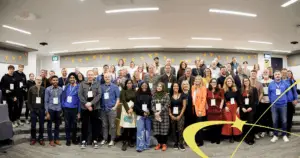

Ticketed events are a big upfront investment of our time and resources without any guarantee of a return on investment—both reputational and financial. To ultimately be profitable, we must give ourselves the best chance of success.
Here is a five-step framework to help event professionals plan for profit, whether that return comes through ticket sales, sponsorship, or new client relationships.
Before you book a venue or talk to any supplier, you need to understand the cost of every element of your event – down to the last paper clip. Your target profit should then be added to this. Once completed, you will have a full picture of the income you will require to meet your profit goals.
This one step changes everything because instead of hoping you cover costs, you are intentionally understanding the full scope of the event and creating facts you can track. As part of building your budget, build also a simple profit and loss model that separates fixed costs and variable costs, which will also show your break-even point. This is the point that your income and costs are the same.
Finally, map out all potential revenue streams—tickets, sponsorship, merchandise, upsells and onsite F&B and services. This could include client acquisition after the event. Then reverse-engineer the numbers so you know exactly how many attendees or sponsors you might need.
Once the numbers are clear, focus on shaping tickets that deliver experiences your market will want to buy. People buy tickets because of value—the price and experience need to make sense. This means you need to be very clear on your market. A fun exercise is to create 5 or more attendee profiles that you are selling tickets to, and build experiences that match each one.
A tiered structure works best. For instance, general admission, VIP, hospitality areas and added benefits etc. give you a greater chance of meeting individual preferences. We don’t live in a world where one size fits all, so design the experiences and tickets to suit the profile of your market.
Add benefits that feel exclusive but don’t add heavy cost—reserved seating, early entry, meet the speakers, networking access, parking—the list is endless. Creativity in ticket design ensures that different audience profiles feel seen.
Once your ticket structure is in place, look at every other element of the event as an opportunity to generate revenue. After ticket sales, what other additional streams can be developed? Think sponsorship, merchandise and on-site upsells which can all increase profitability.
Sponsorship works best when it is woven into the experience, rather than simply offering logo displays. I have seen this time and time again; sponsors seen as cash cows and not valued partners. If you can align your event with a sponsor’s identity, you can create a valuable partnership that supports ambitious long-term success. This requires a strong, value-focused proposal tailored to each potential sponsor. Consider what value you can offer sponsors – keynote speaker slots, hosted roundtables, interactive activities, or even post-event data reports—there are many businesses out there looking for these opportunities, don’t be afraid to reach out.
Upsells are another effective way to build income during the event itself. Merchandise, pre-sale tickets for your next event, and additional services such as food and beverage all add additional revenue whilst also adding to attendee experience.
The best ticket structure won’t matter if nobody knows about the event. Creating demand means identifying where your ideal attendees are and crafting messages that address their needs and promising how you can deliver the solution.
Figure out the best channels: partnerships and referrals can expand reach, your own email lists for targeted communication, and social proof from speakers and past participants to build trust. Don’t just post everything on social media and hope people will buy.
Build urgency into the journey with early-bird pricing, friend referral discounts or short-term specials to get people buying quickly.
Every step of the buying process should be seamless. From a value driven event landing page that sells, to the ease and simplicity of buying and receiving tickets, a seamless experience will increase the confidence of potential attendees.
When the event closes, the event is not over. This is your opportunity to build on your attendees’ experiences. Create a structured follow-up sequence—share replays, event highlights, photos and videos, as well as key takeaways. This will strengthen the connection with your audience and allow you to sell future events to them.
Design a post-event report that gives you data for future events. Areas of success, session attendance and purchasing behaviour of all your revenue streams will give you valuable information for future events.
True innovation comes from knowing your attendees. There is no better place to learn than from attendees themselves, so don’t waste this opportunity. A balance of tangible data such as ticket sales and revenue, combined with intangible insights such as feedback and testimonials, gives you a full picture of your success.
It’s easy to set ticket prices without calculating costs, or to add programming that you think works but doesn’t offer your ideal attendees any real value.
Another common mistake is not planning post-event feedback and thus throwing away key learning opportunities for future event sales.
Profit is lost by overlooking the details.
When done well, early planning of these steps becomes a powerful funnel that drives attendees to buying into the concept of your event. A profitable event doesn’t happen by accident. It is the result of deliberate steps, taken well before the first attendee walks through the door.
By setting your targets, designing value-driven offers, building demand, monetising in the room, and following up to drive future sales, you can create events that deliver both impact and profit.

Nick Oxborrow is an Event Business Success Coach with over 30 years’ experience in the events & hospitality world. He’s built and run a successful international events agency, producing more than 500 events for global brands such as Red Bull, Netflix, and Chanel. Earning awards like Best Guerrilla Marketing Activation and Best Event Planner in Singapore.
Nick now helps event professionals grow profitable, purposeful businesses, offering clarity, strategic growth plans, and confidence without burnout. His mission: cut through the noise, help you focus on what matters, and scale sustainably.
